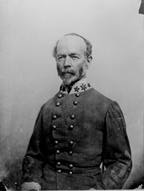

Gen. Joseph Eggleston Johnston - commander of The Army of Tennessee.
General Johnston was born at Farmville, Virginia, on February 3, 1807. A classmate of Robert E. Lee at West Point, he served with great distinction in the Seminole and Mexican Wars, in which he was wounded and brevetted repeatedly. Appointed quartermaster general with the staff rank of brigadier general on June 28, 1860, he resigned April 22, 1861 to enter the Confederate service. He was commissioned a brigadier in the Regular Army of the Confederacy in May 1861 and place din command at Harpers Ferry. Eluding the Union force under General Patterson, he marched to P. G. T. Beau regard's assistance at the battle of First Manassas. His performance there won him full generalcy on August 31, 1961 to rank from July 4, and the command of the Army of Northern Virginia. His being ranked below Samuel Cooper, Sidney Johnston, and R. E. Lee gave rise to an acrimonious debate with President Davis, which rendered great disservice to the Confederate cause. He opposed McClellan in the Peninsular campaign until he was severely wounded at Seven Pines, May 1862, when the army command passed to R. E. Lee. The following November he was made commander of the department of the West. In 1863 Johnston was in the anomalous position of attempting to retrieve the situation at Vicksburg, while the city's commander, General Pemberton, was receiving contrary orders from Richmond. He was assigned to the command of the Army of Tennessee after Bragg's debacle at Chattanooga in November 1863. However, his plan of strategic withdrawal before Sherman displeased Davis, who ordered John Bell Hood to replace Johnston in front of Atlanta, July 17, 1864. He saw no more active service until reassigned by Lee in February 1865 to oppose Sherman's march north. After Lee's surrender to Grant, he capitulated to Sherman on April 26, 1865. From 1879 to 1881 Johnston served in the U. S. House of Representatives from Virginia, and was U. S. commissioner of railroads by appointment of President Cleveland from 1885 to 1891. He also wrote Narrative of Military Operations. He died in Washington on March 21, 1891, supposedly as the result of a cold contracted while marching bareheaded in the funeral procession of his old adversary, Sherman. During the retreat of the army from Dalton to Atlanta Johnston demonstrated himself to be at least the equal of Lee as a defensive tactician; whether he possessed other qualifications requisite in an army commander has long been disputed. He is buried in Green Mount Cemetery, Baltimore.